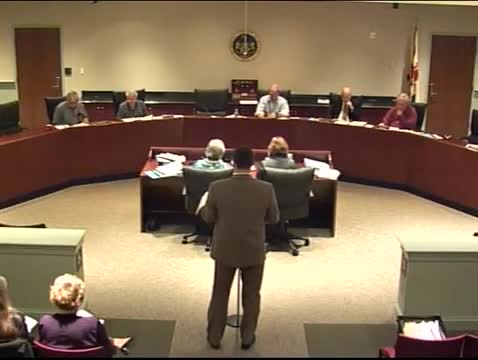County reviews non‑public school bus contract baseline, proposed rate increases and deferred vehicle replacements
Get AI-powered insights, summaries, and transcripts
Subscribe
Summary
Public works staff explained baseline and proposed non‑public school bus contractor rates, driver tiers and an operational maintenance factor; seven buses are currently eligible for replacement and deferral reduces near‑term costs but increases future obligations.
Public works and transportation staff walked the Board of County Commissioners through baseline and proposed numbers for the county’s non‑public school bus contracts, identifying driver pay tiers, maintenance factors and vehicle replacement timing.
George Erickson, a transportation staff member, explained the contractor pay structure and operational factors. “What you basically have in your non public school bus contracts, are several different items. The first are tier 1 and tier 2 driver salaries. Tier 1…drivers that have less than 10 years of experience. And tier 2 drivers have greater than 10 years of experience,” Erickson said. In the baseline he presented, tier‑1 pay is shown as $14.03 per hour and tier‑2 as $14.70; the board‑of‑education rates cited for comparison were $14.44 and $15.11, respectively.
Erickson walked commissioners through the operational and maintenance (O&M) factor calculations that drive per‑mile reimbursements. He said the baseline uses an O&M factor of about 1.03 for diesel buses and 1.19 for gasoline buses; the board‑of‑education figures in the proposal used a higher maintenance factor (about 1.10 and 1.26 in the presentation) because that system uses a higher per‑mile maintenance allowance. On replacements, Erickson said seven non‑public buses are currently eligible for replacement; the PVA replacement‑buses line item shown in the proposal totaled $156,955.68; the total net difference between the baseline and the full proposal was presented as $246,530, with roughly $156,956 attributable to replacement vehicles.
Discussion focused on options to defer replacement buses to lower near‑term spending and on operational efficiencies by coordinating with the Board of Education, including potential transfer points and ride‑sharing between systems if pay, training and insurance standards are aligned. Erickson said the county and Board of Education will continue subgroup talks and report back; he identified March 16 for further meetings of that subgroup.
No formal contract changes were adopted at the March 8 session. Commissioners asked staff to return with costed scenarios showing the savings from specific deferral options and the operational impact of aligning pay and maintenance factors with the Board of Education.
